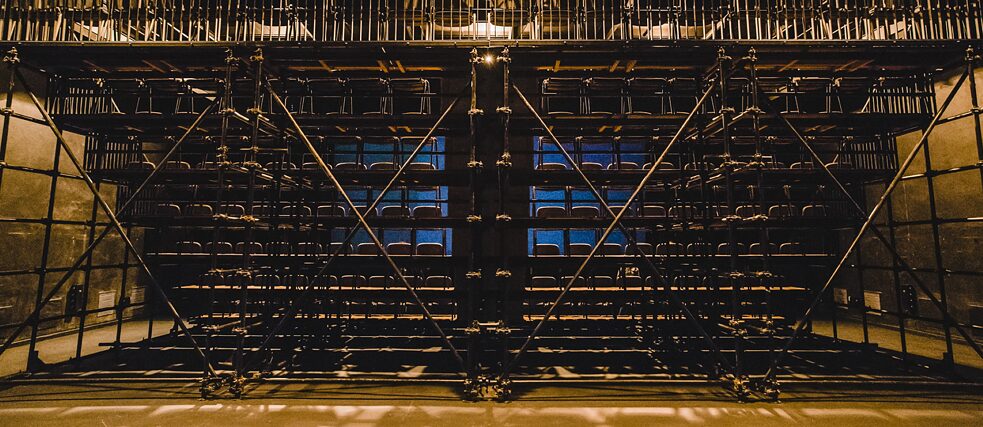A talk with Helgard Haug and Francisco Frazão
From practice to performance, or from theatre to life and back

After several previous appearances in Portugal, the German theatre company Rimini Protokoll is back in Lisbon with “Conference of the Absent”. This unusual experimental production, to be performed at Teatro do Bairro Alto (TBA) on February 24-26, typifies the group‘s approach and is well fitted to the theatre‘s programming. For a deeper understanding of the work of both, I spoke to Rimini Protokoll co-founder Helgard Haug and TBA artistic director Francisco Frazão.
By Raquel Pedro
German theatre group Rimini Protokoll was founded in 2000 by Helgard Haug, Stefan Kaegi and Daniel Wetzel. A combination of avant-garde methods and responsiveness to present-day events situates the group’s work in the category of “documentary theatre”. After early performances in independent and municipal theatres, Rimini Protokoll went on to use a wide range of other spaces, appearing in festivals and winning multiple awards. The way everyday considerations enter the theatre, becoming political and altering audience experience in the process, is interesting. “We often address political matters”, says Helgard Haug, “but instead of stating our own position from a single perspective, we try to incorporate multiple points of view. This has less to do with proposing a solution than with understanding a complex conjuncture or dilemma. I believe the theatre gives us a unique opportunity to take on multiple personal perspectives so as to comprehend multiple ways of seeing something.” Francisco Frazão has been aware of the group’s work since first encountering them at Culturgest in 2007. He agrees that “there is a Brechtian element in the work of Rimini Protokoll in the sense that the performer delivers a sort of report on themself, as if performing a text, a story. Which is almost always personal, autobiographical, because the people the group works with aren’t usually actors, they appear as themselves.”
The climate crisis: more than a talking point
Conference of the Absent makes explicit reference to public alarm at greenhouse gas emissions in the planet’s atmosphere. “The most important reason for doing this play“, says Helgard, “was to remind ourselves of the gigantic carbon footprint we leave through our productions, most of all the when travelling with them.” Thus the group began to develop a new idea. “We want to learn new things through our projects”, Helgard continues. “We developed the concept of the play about absence before the coronavirus outbreak, which brought with it a lot of new and unfamiliar ideas about dealing with the reality of being unable to travel the way you were used to”. And then there are the performance venues. The Teatro do Bairro Alto aims to be a “green theatre”. “It’s not enough to bring the climate issue to the stage as a play”, says Francisco. “It’s probably more important to think about it while writing the play and during the production itself. This happens in many ways to do with travel, stage materials...” Nonetheless, he insists on the importance – given “Portugal’s geographically and also economically peripheral position in Europe and the world” – of bringing international theatre to the country.The play addresses the problems arising from absence and the means of overcoming them. Helgard speaks of “silent agreement that we who are present here can enable and are responsible for the representation of others who are not present”. “As I see it”, adds Francisco, “the actors are themselves in one sense, while in another they are also specialists in absence, in the conception of becoming characters who know something about the questions, what does it mean not to be present? What does invisibility mean? What does not being able to be there mean?” Seen this way, the work is "a game played with the originary game of theatre – conventional theatre included – whereby someone pretends to be someone else. The actor plays Hamlet, yet Hamlet himself is not physically present. Only the actor is there, and in a way we see them both.”
A new kind of play in dialogue with the place of performance
Familiar ways of seeing theatre from other countries are also transformed here. Dialogue with the location becomes paramount in preparing each performance, for example in terms of language: “We have to write a whole new version in this language, working with the local team” says Helgard. “I think it’s unfortunate that theatre is normally only seen with subtitles. Our play can be adapted for all languages because it is mainly performed by the local audience”. As Francisco puts it, “It is not a ‘ready-made’ play. It deals with the issue of translation. A translation means the creation of a text that didn‘t exist before in the other language. Here we create a performance that didn‘t exist before in this cultural context.And as such, it‘s something new.” Ultimately, observes Helgard, “it is not a play where we perform it once, decide it‘s good then keep on doing it. It depends very much on the people who are there.” Francisco sees “the mechanics of the play itself” as “the biggest challenge: to ensure that people that are not only prepared to watch but under the right conditions might also be prepared to act”. We can look forward to the forthcoming Lisbon performances, then, in the expectation of seeing one of the most important present-day concerns, the climate emergency, from multiple perspectives under the burning lens of the experience prepared by Rimini Protokoll.
Comments
Comment